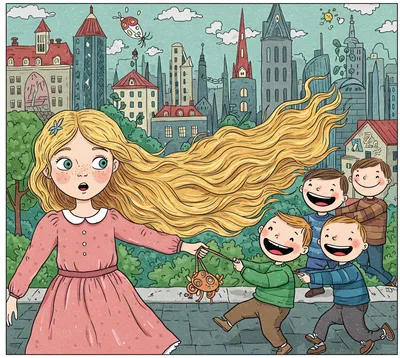I'll Tell Me Ma

Lyrics
The boys won't leave the girls alone
Pulled me hair, and stole my comb
But that's alright, till I go home.
Chorus:
She is handsome, she is pretty
She is the belle of Belfast city
She is a-courting one, two, three
Please will you tell me who is she?
History and Meaning
The lively tune "I'll Tell Me Ma" began its journey as a traditional children's street song in the mid-19th century Irish urban communities. Young girls particularly favored this upbeat skipping rhyme with its natural call-and-response structure perfect for playground games. Children would form a ring by joining hands, with one player standing in the center who would name another child after the verse "Please, won't you tell me who is she?" The named child would then take the center position, creating a game reminiscent of both "Ring Around the Rosie" and tag. Though firmly associated with Ireland today, versions were collected throughout the United Kingdom in the 19th century, suggesting a wider circulation that eventually spread to Scottish, English, and North American communities through migration patterns.
The song holds particularly strong ties to Belfast, Northern Ireland, where the chorus typically celebrates "the belle of Belfast city" – a title the song is often known by in that region. Like many folk songs, it demonstrates remarkable adaptability, with regional variations substituting different locations to reflect local identities. Well-documented alternatives include "the belle of Dublin city," while other recorded versions mention the "Golden City," "London City," "Windy City" (Edinburgh), and even "Belgrade City" in a Serbian adaptation. This process of localization allows communities to transform the song into an expression of local pride and identity.
At its heart, "I'll Tell Me Ma" playfully captures youthful social interactions and early courtship rituals. The lyrics describe childhood squabbles ("Pulled me hair, stolen me comb") alongside the attention girls receive from boys ("The boys won't leave the girls alone"). The narrative explicitly mentions courtship ("She is a-courting one, two, three") and names a specific suitor, Albert Mooney, highlighting competition for the admired girl's attention. One intriguing lyrical element, "Old Jenny Murphy says she'll die / If she doesn't get the fellow with the roving eye," has sparked various interpretations, perhaps suggesting desire for a slightly rebellious "bad boy" figure – though such lines might simply reflect the playful exaggeration often found in children's folklore.
During the folk revival of the 1950s and 1960s, "I'll Tell Me Ma" transitioned from the playground to performance stages, becoming a popular folk standard. Influential recordings by artists like The Clancy Brothers and Tommy Makem (whose 1962 album "The Boys Won't Leave The Girls Alone" took its title from the song's lyrics), The Dubliners, and later Van Morrison and The Chieftains, Sinéad O'Connor, The Rankin Family, and Gaelic Storm helped introduce it to international audiences. Its inherent energy and themes of social interaction proved appealing beyond childhood, cementing its place in the folk music canon and inspiring contemporary adaptations and parodies.